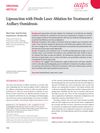 41 citations,
June 2018 in “Medicine Health Care and Philosophy”
41 citations,
June 2018 in “Medicine Health Care and Philosophy” The article suggests using four questions to tell apart necessary medicalization from excessive medicalization, focusing on problem significance, social expectations, medical understanding, and effective resolution.
 39 citations,
April 2011 in “Recent Patents on Drug Delivery & Formulation”
39 citations,
April 2011 in “Recent Patents on Drug Delivery & Formulation” Nanoemulsion-based drug delivery systems are versatile and have potential for treating various medical conditions and improving vaccines.
 35 citations,
May 2012 in “Cochrane Database of Systematic Reviews”
35 citations,
May 2012 in “Cochrane Database of Systematic Reviews” Minoxidil effectively treats female pattern hair loss.
 32 citations,
February 2016 in “Journal of Dermatology”
32 citations,
February 2016 in “Journal of Dermatology” Dutasteride safely promotes hair growth and reduces hair loss, with mild side effects.
 25 citations,
March 2008 in “Surgical Neurology”
25 citations,
March 2008 in “Surgical Neurology” New techniques for treating scalp blood vessel malformations are effective and can have good cosmetic results.
 16 citations,
September 2018 in “Journal of Ethnopharmacology”
16 citations,
September 2018 in “Journal of Ethnopharmacology” Plant-based remedies may treat hair loss by reducing inflammation and improving insulin resistance.
 15 citations,
March 1998 in “Journal of Public Policy & Marketing”
15 citations,
March 1998 in “Journal of Public Policy & Marketing” The paper concludes that drug labels should be clear for all, especially for those with low literacy, and suggests aiming for high comprehension test passing rates with diverse test populations.
 14 citations,
September 2018 in “International Journal of Molecular Sciences”
14 citations,
September 2018 in “International Journal of Molecular Sciences” Mackerel-derived fermented fish oil helps hair grow by activating growth pathways and increasing cell proliferation.
 11 citations,
July 2017 in “Expert Opinion on Investigational Drugs”
11 citations,
July 2017 in “Expert Opinion on Investigational Drugs” New hair loss treatments may include topical medications, injections, and improved transplant methods.
 9 citations,
February 2012 in “Social Semiotics”
9 citations,
February 2012 in “Social Semiotics” The document concludes that modern photo stories help represent and challenge how breast cancer affects women's identities and societal norms.
 8 citations,
August 2018 in “International Journal of Dermatology”
8 citations,
August 2018 in “International Journal of Dermatology” The document concludes that doctors should carefully consider off-label drug use in dermatology and always inform patients, while more research is needed on the safety and effectiveness of such practices.
 7 citations,
August 2013 in “Facial Plastic Surgery Clinics of North America”
7 citations,
August 2013 in “Facial Plastic Surgery Clinics of North America” Megasessions in hair transplant can cover more area or increase density but need a skilled team and careful planning, and have both benefits like less downtime and risks like lower graft survival.
 4 citations,
August 2020 in “Journal of Cosmetic Dermatology”
4 citations,
August 2020 in “Journal of Cosmetic Dermatology” QR 678 and QR678 Neo treatments are effective for hair loss in women with PCOS.
 3 citations,
June 2006 in “Expert Review of Dermatology”
3 citations,
June 2006 in “Expert Review of Dermatology” The document concludes that hair loss is complex, affects many people, has limited treatments, and requires more research on its causes and psychological impact.
 2 citations,
January 2020 in “Journal of Experimental Social Psychology”
2 citations,
January 2020 in “Journal of Experimental Social Psychology” Baldness and shaved heads change how traits are seen but don't really affect leader preferences.
 2 citations,
January 2018 in “Elsevier eBooks”
2 citations,
January 2018 in “Elsevier eBooks” Lipid nanoparticles improve drug delivery through the skin, offering stability, controlled release, and better compatibility with skin.
 1 citations,
October 2023 in “Dermatology and therapy”
1 citations,
October 2023 in “Dermatology and therapy” Some treatments for severe hair loss work but often have side effects, with baricitinib showing the most promise.
 1 citations,
December 2022 in “Middle East Journal of Science”
1 citations,
December 2022 in “Middle East Journal of Science” Permanent hair dyes use chemicals that react with hydrogen peroxide to create color.
 1 citations,
January 2017 in “Social Science Research Network”
1 citations,
January 2017 in “Social Science Research Network” The document suggests creating a secure database for indigenous knowledge and recommends that the TKDL actively fight patents that slightly alter traditional knowledge.
 1 citations,
November 2015 in “Indian Journal of Clinical Biochemistry”
1 citations,
November 2015 in “Indian Journal of Clinical Biochemistry” The conference presented findings on how vitamin D levels, genetic factors, and lifestyle choices like smoking and yoga affect various health conditions and diseases.
 1 citations,
January 2013 in “Archives of Aesthetic Plastic Surgery”
1 citations,
January 2013 in “Archives of Aesthetic Plastic Surgery” Combining liposuction with laser ablation effectively reduces underarm odor with minimal side effects.
 June 2024 in “Research Square (Research Square)”
June 2024 in “Research Square (Research Square)” Young women in West Bengal, India, with PCOS often have estrogen resistance, leptin receptor issues, folate deficiency, T2DM, and acanthosis, commonly linked to obesity.
 April 2024 in “Lasers in medical science”
April 2024 in “Lasers in medical science” Near-infrared LED light improves skin rejuvenation and hair growth better than white LED light.
 March 2024 in “World Journal Of Advanced Research and Reviews”
March 2024 in “World Journal Of Advanced Research and Reviews” Educators who survived COVID-19 faced physical, psychological, and social challenges but overcame them with resilience and support, highlighting the need for schools to provide better health and psychological care.
 January 2024 in “Journal of neurogastroenterology and motility”
January 2024 in “Journal of neurogastroenterology and motility” Quadruple-coated probiotics significantly improve IBS symptoms.
 January 2024 in “Wiadomości Lekarskie”
January 2024 in “Wiadomości Lekarskie” Robotic hair transplantation with AI offers more reliable, precise, and efficient hair restoration.
 November 2023 in “Martor”
November 2023 in “Martor” People still turn to witchcraft for help with modern problems despite technological advances.
 September 2021 in “Physiology News”
September 2021 in “Physiology News” Addressing underrepresentation in Parkinson's research is crucial for better treatments and understanding.
 September 2021 in “Physiology News”
September 2021 in “Physiology News” Air Vice-Marshal Sir Ralph Jackson significantly advanced dialysis technology in the UK.
 January 2019 in “ARC journal of pharmaceutical sciences”
January 2019 in “ARC journal of pharmaceutical sciences” Acne can be managed with various treatments and requires psychological support due to its emotional impact.





























